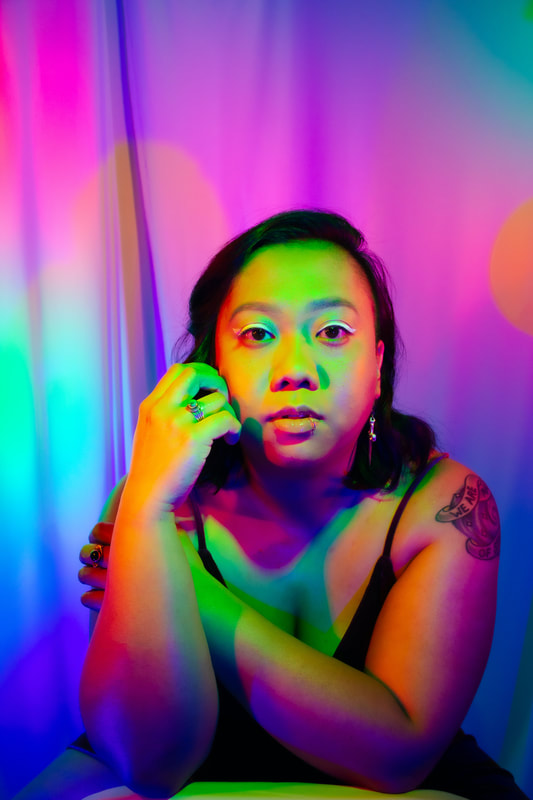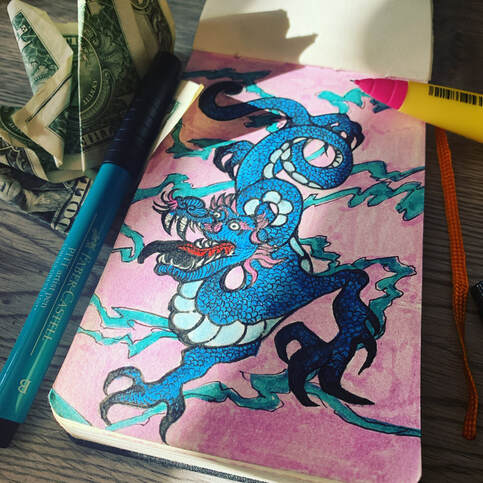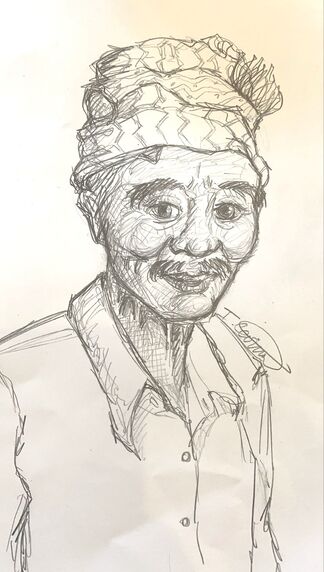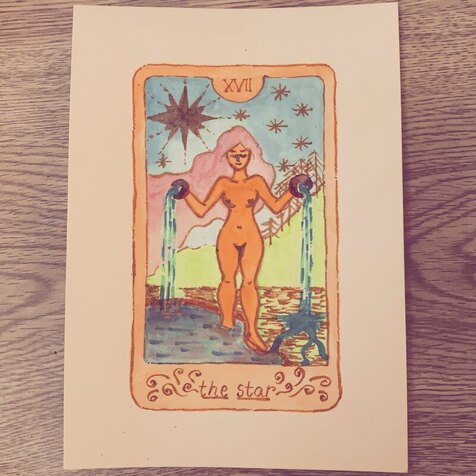|
I am not saying this because of the Asian/Pacific American Heritage Month, but are we - - Cariño, Fujimoto, or other Asian decedents - - living with certain expectations? When I read their following craft essay, "never good enough" strikes me. Being "perfect" is a curse of being an Asian, I wonder. I got to know Cariño's poems and art though #RHINOArt2Art. Then soon after, they won the 2021 Alice James Award for their manuscript Feast, forthcoming from Alice James Books in March 2023. I am really looking forward to reading the manuscript. It is definitely an exciting time for them, but it was not easy getting there. I know - - I am not Cariño - - but I feel the common moya-moya, which is like a haze covering a main core. I am about to reach it, but some doubtful emotion blocks me out. I started practicing the piano when I was four years old, and I had no doubt that I would became a pianist. During my teenage years, I had numerous concerts and competitions to prove my potential, but I ultimately failed. I realized that my skill had never achieved a professional level. But what kind of professional levels was I talking about? Like the International Chopin Piano Competition? This mindset was dangerous, and I do not know when it was seeded. It might be a part of me through Japanese society, education system, and culture around me. And I think that I expected success, much like I tried to learn perfect English when I came here, to America. My mind was changed when I was a finalist for the Kundiman Poetry Prize in 2015. That year, Jeffrey Levine (Tupelo Press) was the final decision maker. He told me, "Naoko, you have plenty of time". Yes. I - - we - - have plenty of time. Things that we learn co-exist through our art. Deep gratitude to Cariño. Taking Time by Ina Cariño When I was an undergraduate, I pursued, at different stages, degrees in music performance, visual art, and English literature. I started playing the violin when I was eleven—too old to really amount to anything in the world of classical music. But I was stubborn, and somehow passed the audition for a small but relatively well-known school of music. My Belarusian violin teacher warned me quite seriously that, though it wasn’t a conservatory, it would most likely be rough. And it was. It seemed I was never good enough, and performing in front of my peers gave me anxiety for the first time since I’d started playing. In fact, I think I got worse over time. A year and a half in, I switched to visual art. But I’m a failed art major too—after one semester of lugging art supplies around campus and barely passing my introductory-level drawing classes, I hopped right back to music. Eventually I would receive my bachelor’s degree in English, with a minor in music performance. It took me about eight years to finish college. I come from a family of creatives. Growing up, my sisters and I took piano and painting lessons and sang in our school choirs. We were encouraged to read and write. I was kind of a sickly kid, and spent a lot of time indoors, so I guess I’m predisposed to creative activities—but looking back, I never really finished anything. I always stopped halfway. I mostly rode on being naturally good at things, which only keeps going if you put in the time and effort. Grad school was different, maybe because I was older and less concerned with the anxieties I had in my early twenties. The two-year MFA program I attended was a magical space for me. Because writing is at first a mostly solitary act, I felt I could take my time and breathe while drafting a poem. I didn’t have to perform for anyone in abstract ways. And though workshop could sometimes be rough, I never once felt crushed after a critique. At the end of my time at the program, my adviser told me that my thesis—the bones of my first poetry manuscript—was “ready.” Some are, he said, and some aren’t. Ordering the poems in my manuscript was a bit like writing a longer poem. At first, I (embarrassingly) ordered them in chronological order from the speaker’s point of view. My adviser laughed and told me to take stock: what motifs, images, forms, and emotional cores did each poem have, and what was heightened or muffled when one poem followed another? I spent so many nights in my last semester shuffling my poems, reading and rereading them. I read them out loud, over and over. So much time, creating this body of work. I had to finish, and I did. Finally, I’d seen something that I’d created through until the end. After grad school, I worked your typical after-grad-school job as a barista for about a year. When the pandemic hit, I made the decision to quit because I would make more money on unemployment. Those were hazy months. Between taking part in Black Lives Matter protests and spending more time in my apartment with my cat than I’d ever done before, I’d been sending out my manuscript everywhere, and was a finalist a couple of times for first book prizes. But really, I was losing hope for my writing; my manuscript was rejected over and over again. Unemployment didn’t last forever. Currently, I’m a technical writer for a loan and mortgage company. I work remotely Monday through Friday, from 8 to 5, with an hour lunch. Every workday has been a struggle. I don’t feel like writing after work, and, like others, I felt so isolated during quarantine. One day in March this past year, during my lunch hour, I got a call from a press to which I’d submitted my manuscript, and they told me that I’d won their book prize. It had been two years since I graduated from my program. I know that for many, it takes even longer. Of course, I was thrilled. Still, right now, I feel so far away from the poems from my thesis, and so far away from any poems that I’ll write in the future. I’m kind of in limbo, floating back and forth between almost writing and not writing at all. And I think that’s okay. In the past I’d wondered if it was too late to go back to art, to music. And I think it’s not. And we still have so much time in isolation, even as the new CDC mask guidelines have been announced. I’ve been drawing more. I’ve been trying my hand at watercolor, something I’ve always been terrible at. I picked the guitar back up, when I’d only dabbled in playing it in the past. And sometimes I worry that I’m not really a poet, which is a fear that many poets probably have. Every day is a struggle, each moment shifting and changing in ways that can sometimes make things seem more uncertain. And I’ll never be a violin virtuoso, or an artist with solo shows. But I think I’ve finally made peace with the fact that things take time, and that time takes time, too. Ina Cariño holds an MFA in creative writing from North Carolina State University. Their poetry appears or is forthcoming in Poetry Northwest, Apogee, Wildness, Waxwing, New England Review, Tupelo Quarterly, and elsewhere. Ina is a Kundiman fellow, a Best of the Net finalist, a Pushcart Prize nominee, and a recipient of a fellowship from the Vermont Studio Center. They are the winner of the 2021 Alice James Award for their manuscript Feast, forthcoming from Alice James Books in March 2023. In December of 2019, Ina founded a poetry series, Indigena Collective, centering marginalized creatives in the community.
Comments are closed.
|
Archives
July 2024
|
フジハブ
Welcome to FUJI HUB: Waystation to Poetry, Art, & Translation. This is not your final destination. There are many links to other websites here, so please explore them!
Welcome to FUJI HUB: Waystation to Poetry, Art, & Translation. This is not your final destination. There are many links to other websites here, so please explore them!
What are you looking for?
FUJI HUB Directory
Popular Sites:
Gallery of Graphic Poems
Working On Gallery
(Monthly New Article by Writers & Artists)
About Naoko Fujimoto
Contact
Naoko Fujimoto Copyright © 2024
FUJI HUB Directory
Popular Sites:
Gallery of Graphic Poems
Working On Gallery
(Monthly New Article by Writers & Artists)
About Naoko Fujimoto
Contact
Naoko Fujimoto Copyright © 2024






